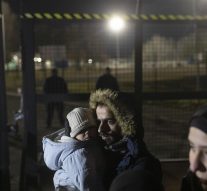
Migrants in European political storms
Migration 6 September 2020Migrants seem to be most omitted group during the Covid19 crisis in Europe. With a slight alleviation of borders opening policies, the EU Member States decided to receive more migrants coming from the Western Balkans. However, not everything goes smoothly as the pandemic’s second wave again got stronger which was followed by the borders re-closure. Meantime, the Europe was hit by series of political turmoil across the continent, which again led to omission of migrants’ problems in the Old Continent. The newest crisis put the Europe’s attention to the Belarusian crisis. What do the European media say about the migrants these days? What are the hot topics on migrants?
The InfoMigrants portal reports that police in North Macedonia “have found 94 migrants hiding inside the back of a cargo truck”. The discovery came after a police patrol stopped the truck with Macedonian national license plate late Saturday. The incident took place near the town of Radovish, 110 kilometers (70 miles) southeast of the country’s capital, Skopje. Authorities said that the migrants came from Syria, Afghanistan, Iraq and Pakistan, and that they had entered the country through the Greek border. They have since been transferred to a migrant shelter in the border town of Gevgelija, pending deportation to Greece. The driver of the truck was reported to have fled the scene, police said.
The border between Greece and North Macedonia had been closed earlier this year due to the global coronavirus pandemic. However, human traffickers continue to move migrants across the border using irregular crossings. There have been numerous accidents with serious injuries this year among migrants as part of the illegal smuggling activities in North Macedonia.
The New York Times announced that the Greek government has secretly expelled more than 1,000 refugees from Europe’s borders in recent months, sailing many of them to the edge of Greek territorial waters and then abandoning them in inflatable and sometimes overburdened life rafts. Since March, at least 1,072 asylum seekers have been dropped at sea by Greek officials in at least 31 separate expulsions, according to an analysis of evidence by The New York Times from three independent watchdogs, two academic researchers and the Turkish Coast Guard.
At the beginning of September, the CNN reported on how the migrant crisis got worse during the pandemics. It believes that “European responses have often been brutal”. Humanitarian organizations say pushbacks at borders in countries such as Greece, an absence of sea rescues in the Mediterranean and unhealthy quarantine arrangements have created huge challenges. And it comes at a time when movement is harder and more dangerous thanks to travel restrictions and the closure of transport routes and processing centers. Last week, a man was found dead on Sangatte beach, near Calais in northern France. He and a friend had tried to cross the English Channel, one of the world’s busiest shipping lanes, in an inflatable dinghy with shovels for paddles. The friend said he was just 16, but French authorities said his papers belonged to a 28-year-old Sudanese migrant and an autopsy showed he was an adult. He could not swim, his companion said.
The BBC argues the migrant crisis changed this year. They published a short story on how the crisis evolved in different parts of European continent. BBC puts the big shift in migrant’s crisis in 2020, when police in North Macedonia fired teargas at people trying to cross the border with Greece. The authorities said they were overwhelmed. It seemed like Europe had suddenly become keenly aware of a problem that had been hiding in plain sight. In Hungary the government announced it would erect a fence on its border. Police also sealed off the main railway station in Budapest to stop people travelling further. But the measures just forced people into the hands of smugglers and illegality. The dead bodies of dozens of migrants were later discovered in the back of a lorry that had travelled from Hungary into Austria. It was a shocking moment that highlighted the issue of people smuggling and the desperation of those caught up in the crisis. On another hand, Angela Merkel, like all of us, was horrified by the lorry discovery. It seemed to have a profound impact on her. Just days later she said at least 800,000 people would likely seek asylum in Germany that year. And for the first time she used what would become her catchphrase: “wir schaffen das” – we will manage it.
This article briefly presented how the migrant crisis is perceived by the global media despite numerous attentions placed for the Covid19 and political turmoil such as the on occurring in Belarus. The migrant crisis is among the most durable crisis in modern Europe, thus its resolution will be followed with a great global attention.


